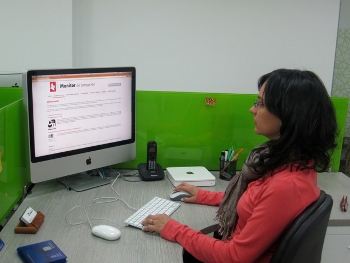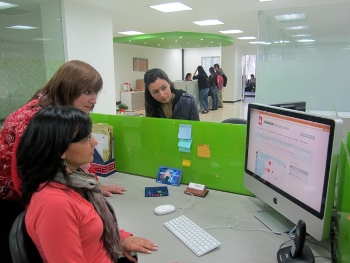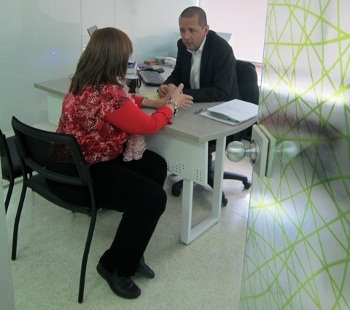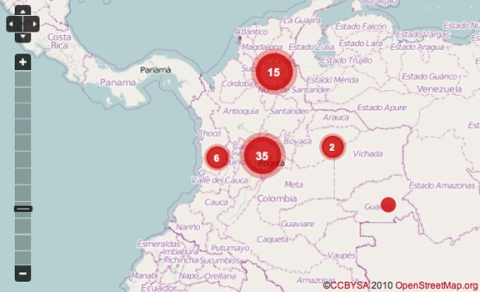
Consejo de Redacción staff will vet the citizen reports for accuracy before posting to the Corruption Monitor. (Photo by Tiffen Tapia)

Knight International Journalism Fellow Ronnie Lovler, left, and Consejo de Redacción staff members Miriam Forero and Maria Fernandez Serrato Rodríguez review the Corruption Monitor minutes after its launch. (Photo by Tiffen Tapia)

Consejo de Redacción executive director José Luis Novoa and Knight Fellow Ronnie Lovler worked together to bring the corruption map to fruition. (Photo by Tiffen Tapia)

The Corruption Monitor maps journalist and citizen reports of misuse of funds, bribery, fraud and other incidents of corruption across Colombia.
The "Monitor de Corrupción" (or "Corruption Monitor") will provide journalists and citizens a platform to submit reports that will expose and map incidents of corruption.
It’s a project I anticipate will contribute to making Colombia a more transparent and stronger society. The idea for this grew out of another similar project by Knight Fellow Jorge Luis Sierra.
“From the Arab spring through the defeat of the proposed judicial reform in Colombia, we have seen how citizen movements have regained their dominant role in the democratic debate,” said Fabio Posado, president of the Consejo de Redacción. “The Consejo de Redacción and ICFJ, conscious of the need to encourage citizen participation and to promote investigative journalism, are launching this project which permits both citizens and journalists to be involved.”
I first proposed this project to the Consejo’s administrative staff in January, as part of my work as a Knight International Journalism Fellow. They took it to their executive board, which presented the project to the organization’s annual members' assembly in March.
After that, we immediately got to work, determining 11 categories to reflect misuse of funds, bribery, fraud and other incidents of corruption. We wrote the text and put all the other pieces in place for our open-source Ushahidi mapping platform.
What makes our map unique in Colombia is our two-tiered reporting system that allows both journalists and citizens to submit reports about corruption in their communities, municipalities and on a broader scale, regionally and nationally.
Our map provides a way for journalists to post their stories on the site and a tool that lets users monitor specific incidents of corruption and see whether there are patterns and similarities in the types of incidents. The map launched with nearly 60 journalists’ reports on corruption. Citizen reports, which will be included soon, will be confirmed by the map’s administrative staff, with the support of Consejo journalists.
Additionally, I will be training teams of citizen journalists on ways they can participate in the project with several hands-on workshops with regional media. I will give my first workshop in August at La Patria newspaper in Manizales.
A principle challenge was coming up with a name that worked. We were thrilled when we hit upon “Corruption Monitor” because the same key words cross the language divide between English and Spanish. And of course, this makes it perfect for SEO!
My relationship with the Consejo started when I was asked to participate in a series of one-day workshops at different sites throughout the country. As an organization concerned with investigative reporting and looking at corruption in particular, development of this map was a natural fit.
The offices of United Nations Organization for the Coordination of Humanitarian Affairs in Colombia and the Javeriana University in Bogota also are supporting our effort.
This is one of three projects I am working on in Colombia.
I am developing another crowdsourced map, this one tracking crime in Bogota, with El Tiempo, Colombia’s largest newspaper.
My third project has been as co-organizer of Bogota’s first Hacks/Hackers chapter. Hacks/Hackers is an international, grassroots journalism organization with more than 10,000 members. It works to bring journalists (hacks) and developers (hackers) together for collaborative projects.
Our first Hacks/Hackers project in Colombia will be the development of a digital environmental map, to be created at a hackathon on Aug. 11.